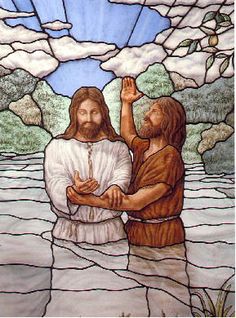
(LDS Media Library)
Compare Mark 1:2
Much could be said of these verses, but I’ll confine myself for now to just four observations:
1.
Some critics of traditional Christian claims have made a lot of the fact that Jesus never explicitly describes himself as divine, the Son of God, and so forth.
Yet, in Matthew 11:2-6 and Luke 7:18-23, we see an instance of how, even when he’s asked a clear question, he answers implicitly, not expressly. He doesn’t say Yes, and he doesn’t say No. Not in those words. But he describes what he’s doing, which plainly accords with messianic expectations and, therefore, virtually screams Yes.
2.
Jesus praises John the Baptist very highly, describing him as “more than a prophet” and saying that nobody born of a woman (which covers most of us, I think) has been greater, yet, almost immediately thereafter, he points out that whoever is least in the kingdom of heaven (as given in Matthew) or the kingdom of God (as given in Luke) is greater than John.
What does this mean? Being born again, into the Kingdom, makes one a prince (or princess) and an heir of God. That’s greater than merely mortal greatness, and greater than John on his own.
3.
Latter-day Saints have been taught by the Prophet Joseph Smith about the office of an “Elias” or forerunner. Clearly, in Matthew 11:14, that’s how the name is being used. Jesus surely wasn’t teaching that Elijah had been literally reincarnated in John; reincarnation was not a Jewish doctrine, and never has been. Thus, plainly, Jesus is saying that John has come in the manner and role of Elias 0r Elijah. The name is being used, in other words, to designate an office or function.
For more on Elias/Elijah from a Latter-day Saint perspective, see here.
4.
The female personification of wisdom implicit at both Matthew 11:19 and Luke 7:35 goes back to at least the Old Testament book of Proverbs, and, of course, to the fact that the Hebrew word for wisdom is a feminine noun.
I’ve written on a matter that I see as closely related here and, more adequately because at greater length and in greater detail, here.
With those articles in mind, here’s a recommendation:
The other night, I watched a roughly 50-minute documentary on Netflix that was hosted by Dr. Francesca Stavrakopoulou, the Oxford-educated Head of the Department of Theology and Religion at Britain’s University of Exeter and a specialist on the Hebrew Bible. It was entitled “Did God Have a Wife?”
Just so you know: Dr. Stavrakopoulou, raised without religion by a Greek father and an English mother, is a self-declared atheist who does not think highly of the historical accuracy of the Bible. But this was a fascinating documentary that, with a few points of disagreement, I personally found quite congenial to a Latter-day Saint point of view.










